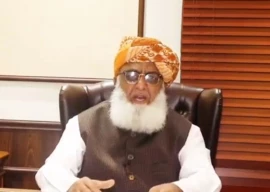Muhammad Saleem is in a fix these days. Should he go work to sustain his family, or relegate himself to bed as advised by doctors who have told him to avoid physical exertion so that he does not suffer a relapse of hepatitis C.
Almost seven years back, Saleem, a father of six, had applied for a job in Saudi Arabia. However, when he got the results of his medical test — a part of the visas process — he learnt he had hepatitis.
The 45-year-old from Swat Valley is raising his children in poverty after spending most of his limited savings on treatment. Despite efforts to get treated at the provincial government’s expense, help has not been forthcoming.
“It was the worst day of my life when the doctor diagnosed me. Not only do I have this disease, it also deprived me of the opportunity to earn more abroad and secure a better future for my family,” Saleem told The Express Tribune.
While unsure of how he got the disease, Saleem has been extra careful to keep his family members from getting infected. “Though the behaviour of people around me, did not change, I felt embarrassed that I had to separate my toothbrush, towel and other things at home as a precaution,” he said, adding that his wife had her blood tested twice after he was diagnosed, and the results were clean each time.
Saleem has spent over Rs200,000 on the treatment of the disease but has not felt any change in his body despite four years of regular treatment. Now he has approached the government-run Lady Reading Hospital in Peshawar, hoping to get free treatment.
“My family is suffering because of me. There is no one to cover household expenditure and I have two daughters who are of marriageable age,” Saleem said.
On the rise
The prevalence of hepatitis B and C continues to increase in Khyber-Pakhtunkhwa, despite the provincial health department running two separate programmes to facilitate patients and provide medication to all district level and teaching hospitals in the province.
More than 9% of the province’s population suffers from hepatitis C, while another 2% have hepatitis B, according to K-P Hepatitis Control Programme Project Director Dr Ghulam Subhani.
Subhani said the total budget in Annual Development Fund for treatment of hepatitis is Rs360.475 million, while another Rs500 million were sanctioned for hepatitis treatment under the Benazir Health Support Programme in the 2010-11 budget.
In 2011, around 3,000 hepatitis B patients and 15,000 hepatitis C patients were treated under the programme free of charge.
Moreover, 71,000 patients were tested for hepatitis B and 31,500 were tested for hepatitis C. Another 7,850 patients were administered the Polymerase Chain Reaction (PCR) test, which is a technique used to amplify the number of copies of a specific region of DNA in order to produce enough DNA to be adequately tested, according to Hepatitis Central, an online resource on the disease. The test helps in early detection and is crucial to controlling the spread of hepatitis.
“We will test around 600,000 patients this year and 30,000 will be given PCR tests in an effort to detect all carriers in the province,” the project director said.
The target for 2012-13 is to provide free treatment to around 40,000 patients across the province, for which new budget
would be sanctioned by the end of August 2012, Subhani added.
Moreover, the K-P government will give Peginterferon — an antiviral drug used to treat chronic hepatitis C — to around 1,600 patients who qualify under the set criteria. “Patients must provide Zakat forms, lists of previous medicine, PCR records and identity cards so that the injections can be given to deserving patients,” he said.
The main problem in the smooth running of the programme is lack of public awareness, which is why few poor people sign up for it.
“We are providing free treatment in all hospitals of the province, but people still don’t know,” he said, while stressing that poor patients should take advantage of the facilities and not spend their limited resources on buying medicines.
Around Rs3.7 million was sanctioned in the ADP for the awareness programme, which was underutilised and was eventually given back to the finance department, according to Dr Suhban.
According to the report issued by the district health information system, 26,542 blood samples were collected from three major hospitals in Peshawar and three blood transfusion centres in the first three month of this year, 21 of which tested positive for HIV, 585 for hepatitis B, 396 for C, and 62 with other diseases.
Published in The Express Tribune, July 28th, 2012.
COMMENTS (2)
Comments are moderated and generally will be posted if they are on-topic and not abusive.
For more information, please see our Comments FAQ

1731916090-0/sabrina-(3)1731916090-0-165x106.webp)

1731915778-0/BeFunky-collage-(66)1731915778-0-165x106.webp)
1731914690-0/trump-(26)1731914690-0-165x106.webp)



1731909919-0/Express-Tribune-(15)1731909919-0-270x192.webp)








It is very sad that the fund meant for awareness program is refunded . Awareness among the public about the disease, symptoms, reasons , govt. schemes available for the free treatment, free vaccination for hepatitis are the first and foremost step towards reduction/elimination of the disease which has infected a sizable number of people.Health care services are urgently required to be improved. At least the ruling Parties should arrange expedite the process for the sake of their vote bank which will also really help the needy.
I am sorry to say that few figures given here are quiet off. The prevalence of Hepatitis C cannot be 9%. Pakistan's prevalence is around 4%. It is also not supported by the numbers in the last paragraph. Awareness is critical here; there is an out of proportion fear in Pakistan and a lot of baseless facts about Hep C. This disease has a very low rate of sexual transmission (almost none in a monogamous relationship). Few people who have this disease go on to develop scarring of the liver and develop significant problems. Large number of people with Hep C will live a normal life span and die of other reasons. It is a slow growing disease and on average takes 20 to 30 years to develop to end stage of scarring. It has different sub types and the one in Pak is very responsive to treatment. The issue here is awareness and educating the patient and family. There is an unnecessary scare in Pak about Hepatitis C and it needs to be corrected.